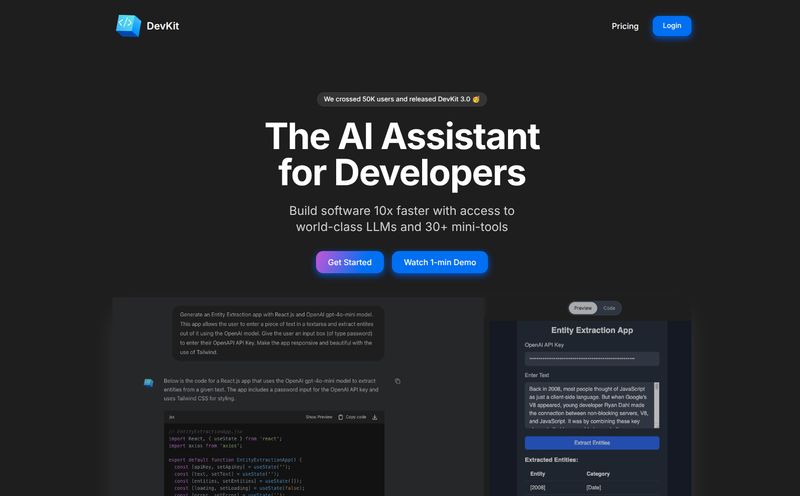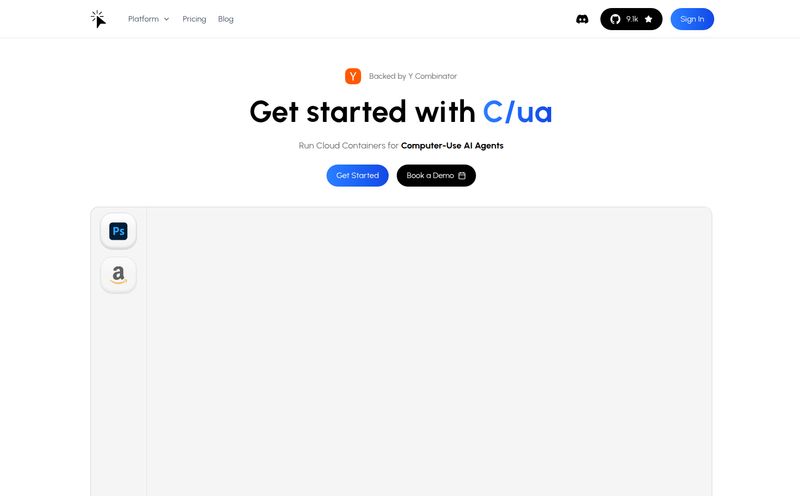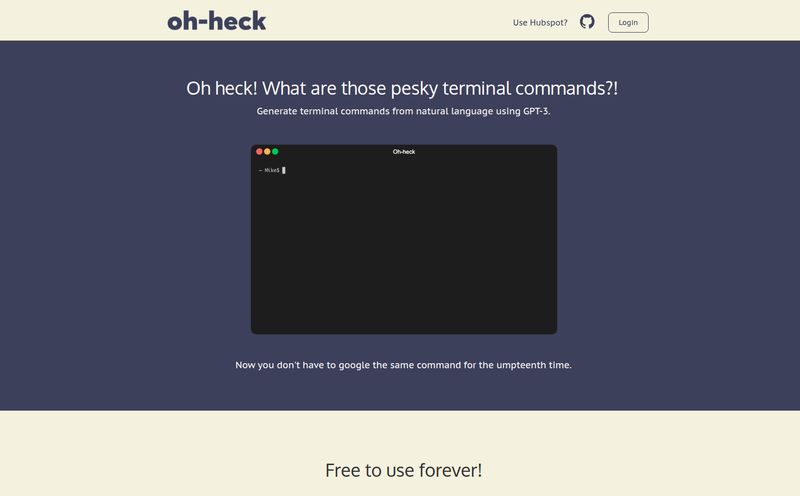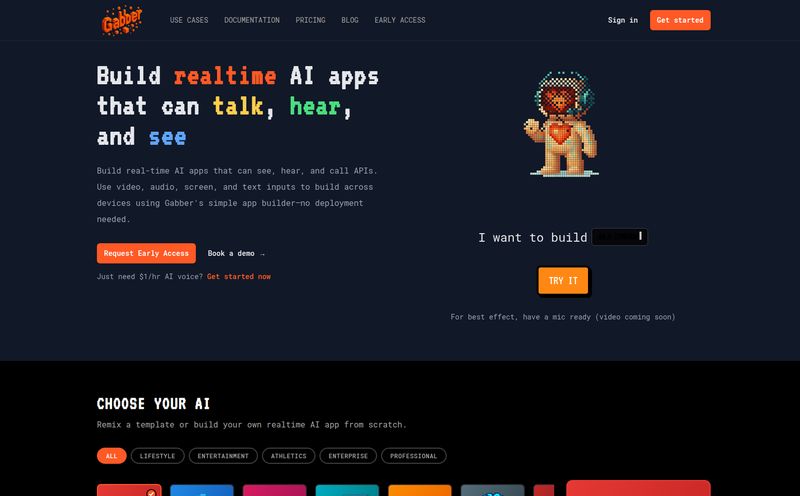If you’ve been in the digital space for more than a minute, you know the feeling. You’re juggling data across AWS, maybe some assets on Google Cloud, and an archive on a separate service. Each has its own rules, its own pricing labyrinth, and its own security dashboard flashing more alerts than a Christmas tree. It's a chaotic, expensive, and frankly, a nerve-wracking way to operate. The whole “data is the new oil” thing is true, but they forgot to mention that it’s incredibly flammable and a massive pain to store safely.
Every so often, a new platform pops up promising to be the one-stop-shop, the silver bullet, the thing that will finally let us sleep at night. Most of the time, I’m skeptical. I’ve seen too much vaporware and too many “paradigm shifts” that were just old ideas in a new UI. But then I stumbled upon Kapsul, and I have to admit, my curiosity was piqued. It’s not just another storage bucket; it’s talking about “Programmable Storage” and “Adaptive Data Management.” Buzzwords? Sure. But there might be something genuinely different under teh hood here.
So, What Exactly is Kapsul? (And Why Should You Care?)
Okay, let's break this down. Kapsul bills itself as “Storage as a Software.” Forget thinking about storage as a dumb digital warehouse where you just dump files. Instead, imagine it as a smart, programmable layer that sits over your data. It’s like giving your data an operating system.
It’s built on a foundation of AI and Blockchain technology. I know, I know—hearing “AI and Blockchain” in the same sentence can often set off the hype alarms. But here, the application seems practical. The AI helps adapt how your data is managed based on its context, and the blockchain provides an immutable, verifiable ledger of who did what, when. It’s about creating trust and intelligence right into the storage fabric itself. The big idea is to unify everything—privacy, compliance, reliability, and access—into one customizable platform. No more duct-taping three different services together and hoping they play nice.
The Features That Actually Matter
A feature list is just a list until you see how it solves a real problem. Kapsul has a few core ideas that, in my experience, address some of the biggest pains in data management today.
Adaptive Privacy and Security: Your Data's Personal Bodyguard
This is the part that really got my attention. Instead of a one-size-fits-all security policy, Kapsul allows for what it calls “dynamic reliability” and “enhanced privacy.” Think of it like a data chameleon. It can automatically tailor its replication and encryption strategies based on the data’s importance or the user’s context. For instance, sensitive customer PII (Personally Identifiable Information) could be set to have maximum encryption and be replicated across multiple geographic regions for resilience. Meanwhile, a public-facing marketing image could have a more relaxed, cost-effective policy. This is smart, granular control that most platforms just don’t offer out of the box.
And it has built-in regulatory compliance. Anyone who’s lost hair trying to make their infrastructure GDPR or CCPA compliant knows what a godsend this could be. Having the compliance logic built-in, rather than bolted on, could save countless hours and reduce a ton of risk.
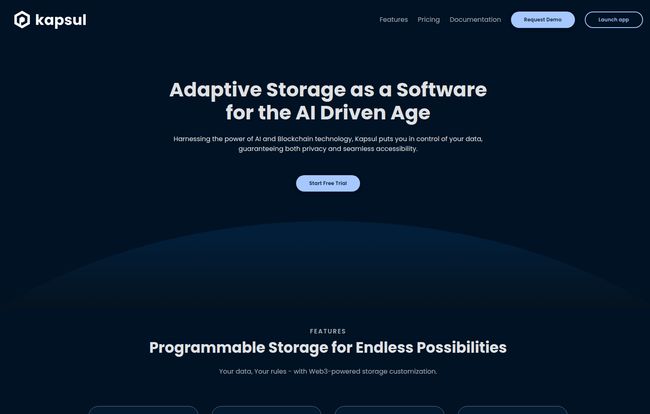
Visit Kapsul
Integrated Multi-Cloud Support Without the Migraine
We all know diversification is good. Relying on a single cloud provider is a recipe for vendor lock-in and a single point of failure. Kapsul gets this and has multi-cloud support baked right in. But it’s more than just connecting to different clouds; it's about managing them from one unified place. You can spread your data across providers to boost scalability and reliability without having to manage multiple consoles and APIs. That’s a huge win for both resilience and sanity.
Programmable Storage: The Real Secret Sauce
This is the core concept. It's what separates Kapsul from just being another decentralized storage network. Programmable Storage means you, the developer or architect, can define rules and logic for how your data behaves. It’s like building with data Legos. You can create a policy that says, “If this data hasn’t been accessed in 90 days, automatically move it to cheaper archival storage. If it's accessed by a user from the EU, ensure its primary storage remains within EU borders.” This level of automation and context-aware management is incredibly powerful and, until now, has usually required a ton of custom code and complex orchestration.
Let's Talk Turkey: The Kapsul Pricing Model
Alright, cool tech is great, but what’s it going to cost me? This is where many ambitious platforms fall flat with convoluted pricing that requires a PhD to understand. Kapsul’s model seems refreshingly straightforward, following a “Pay As You Grow” philosophy. You only pay for what you use.
Here’s a quick breakdown based on their pricing page:
| Service | Cost | Best For |
|---|---|---|
| Prime Storage | $0.05 /GB/month | Frequently accessed, high-performance data. |
| Vault Storage | $0.01 /GB/month | Cost-effective storage for archives or infrequently accessed data. |
| Egress (Data Transfer Out) | $0.06 /GB | Fee for data transferred out. Inbound is free. |
| API Requests | $0.30 per 10,000 requests | First 10,000 requests per month are free. |
My take? The storage costs are competitive. $0.05 for prime storage and a penny for vault storage is in the same ballpark as the big guys. The API request model with a generous free tier is also very fair. The one to watch, as always, is the egress fee. $0.06 per GB for data transfer out is something to factor into your architecture. It’s not astronomical, but if you have a high-traffic application serving large files, it can add up. Plan accordingly!
The Good, The Bad, and The Blockchain-y
No platform is perfect, so let’s get down to the nitty-gritty. After looking through everything, here are my initial thoughts on the pros and potential cons.
The Good Stuff (My Take)
The biggest advantage is the unified platform. The idea of managing storage, privacy, compliance and reliability from a single dashboard is the holy grail for many DevOps and engineering teams. The customisation is another huge plus. You're not forced into a rigid, one-size-fits-all box. The adaptive nature means you can build a truly intelligent and efficient data strategy. And honestly, the built-in multi-cloud support is a fantastic feature for de-risking your infrastructure.
The Potential Hiccups
On the flip side, Kapsul states that fully using its programmable storage might require some technical expertise. This isn't a simple drag-and-drop solution for your grandma’s photo album. It’s a powerful tool for developers and architects, and there will likely be a learning curve. Secondly, the reliance on blockchain technology introduces complexities. While it offers verifiable trust, some might worry about potential latency or transaction costs, though Kapsul’s architecture seems designed to mitigate this. And I’ll say it again: always, always model your costs around those egress fees.
Who is Kapsul Actually For?
So, who should be sending a “Request Demo” email right now? In my opinion, Kapsul looks like a fantastic fit for industries with complex data and stringent compliance needs. I’m thinking of:
- Healthcare Tech: Managing sensitive patient data under regulations like HIPAA.
- FinTech: Securing financial records and transaction data with a verifiable audit trail.
- Media: Creating adaptive storage policies for massive video and image files.
- Web3 and dApps: Any developer building decentralized applications that need a robust, trustless storage backend.
If you're a small business running a simple WordPress site, this is probably overkill. But if you're building a next-generation application and are already feeling the pain of data management chaos, Kapsul should definitely be on your radar.
Final Thoughts
Kapsul is ambitious. It's aiming to solve a problem that has plagued the tech industry for years: the fragmentation of data services. By combining programmable logic, multi-cloud flexibility, and an intelligent, adaptive core, it presents a genuinely compelling vision for the future of data management.
It’s not a magic wand, and it will require some smart people to implement it effectively. But it moves the conversation from “Where do I store my data?” to “How should my data behave?” And that, my friends, is a fundamental shift. It’s an exciting new tool, and I’ll be keeping a very close eye on it.
Frequently Asked Questions (FAQ)
- Is Kapsul a complete replacement for AWS S3 or Google Cloud Storage?
- It can be, but it’s better to think of it as a layer of intelligence on top. Kapsul has its own decentralized storage network but also integrates with other cloud providers. You could use it to manage data across AWS, Google, and its own network from a single point of control.
- How does the AI work in Kapsul?
- The AI is primarily used for the 'adaptive' part of data management. It analyzes the context of the data—its type, usage patterns, user permissions, security requirements—to help automate and optimize storage policies, like moving infrequently used data to cheaper tiers or adjusting encryption levels.
- Is using a blockchain for storage secure?
- Yes, it can be very secure. The blockchain component in Kapsul isn’t for storing the data itself, but for creating a tamper-proof, verifiable log of all activities and policies. This provides an immutable audit trail, which enhances trust and security by making every action transparent and traceable.
- What kind of skills do I need to use Kapsul?
- To get the most out of Kapsul's programmable features, a background in software development, DevOps, or cloud architecture would be very helpful. You'll be defining rules and policies, likely through an API or a specialized configuration language, so comfort with code and system design is a plus.
- Is Kapsul good for a small project or a personal website?
- For a very small, simple website, Kapsul might be more powerful than you need. Its strengths really shine in applications with complex data types, multiple user roles, and compliance requirements. For simpler needs, traditional hosting and storage solutions might be more straightforward.
- How does the 'Pay As You Grow' model really work?
- It's a usage-based model. You are billed monthly based on the amount of data you store (in either the Prime or Vault tier), the amount of data you transfer out of the platform (egress), and the number of API calls you make beyond the free tier. There are no large upfront commitments or fixed monthly fees, so your costs scale directly with your usage.
Reference and Sources
- Kapsul Official Website: https://kapsul.ai/
- Kapsul Pricing Page: https://kapsul.ai/pricing/
